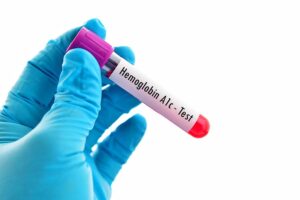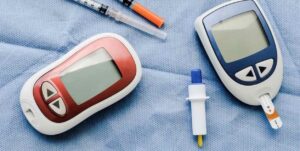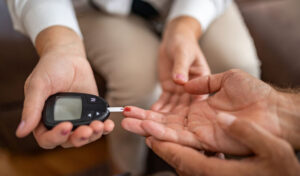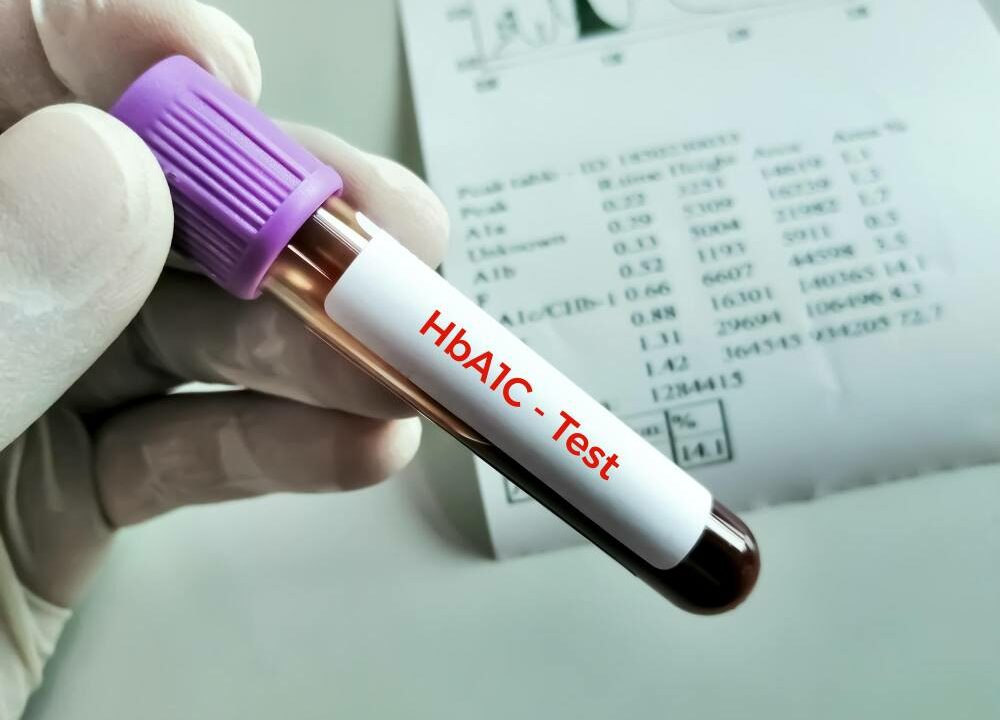In the journey to manage diabetes effectively, understanding and controlling HbA1c levels is crucial. Hemoglobin A1c, or HbA1c, provides a long-term snapshot of blood sugar levels, reflecting average glucose levels over the past two to three months. A reading of 12% is significantly higher than the recommended range, indicating a critical need for intervention to prevent the long-term complications of diabetes. Thus, in this blog, we aim to discuss HbA1c 12 treatment options and provide tips to prevent the condition beforehand.
Contents
Is HbA1c 12 High?
 Yes, an HbA1c level of 12% is considered significantly high and indicates poorly controlled diabetes. The Hemoglobin A1c (HbA1c) test measures the percentage of blood sugar attached to hemoglobin, the oxygen-carrying protein in red blood cells. Under normal circumstances, the HbA1c level in people without diabetes is below 5.7%. For those with diabetes, the goal is typically to keep the HbA1c below 7% to reduce the risk of developing complications related to the condition.
Yes, an HbA1c level of 12% is considered significantly high and indicates poorly controlled diabetes. The Hemoglobin A1c (HbA1c) test measures the percentage of blood sugar attached to hemoglobin, the oxygen-carrying protein in red blood cells. Under normal circumstances, the HbA1c level in people without diabetes is below 5.7%. For those with diabetes, the goal is typically to keep the HbA1c below 7% to reduce the risk of developing complications related to the condition.
An HbA1c level of 12% suggests that blood sugar levels have been consistently much higher than the recommended range over the past two to three months. This exposes the individual to a greater risk of diabetes complications such as cardiovascular disease, nerve damage, kidney failure, and eye problems.
Addressing an HbA1c level of 12% requires immediate attention and action to bring it down to safer levels. This often involves a comprehensive management strategy. Patients must work closely with their healthcare team to customize a treatment plan that effectively addresses their specific needs and health conditions.
What Are The Signs Of Seeking HbA1c 12 Treatment?
When HbA1c levels reach 12%, it signals a critical state of uncontrolled diabetes, and certain signs and symptoms may prompt the need for immediate medical intervention and treatment adjustment. Recognizing these signs is crucial for preventing severe complications associated with high blood sugar levels. Here are some key indicators to look at:
- Persistent High Blood Sugar Readings: Regular monitoring might show consistently high blood glucose levels, far above the target range recommended by healthcare professionals, indicating that the current treatment regimen is not effectively managing diabetes.
- Frequent Urination and Thirst: High levels of glucose in the blood can lead to excessive urination as the body tries to eliminate the excess sugar. This can also result in increased thirst as the body attempts to replenish lost fluids.
- Unexplained Weight Loss: Despite eating more to satisfy increased hunger, weight loss may occur. This is because the body is unable to use glucose properly and starts burning fat and muscle for energy.
- Fatigue and Weakness: High HbA1c levels can result in feeling unusually fatigued and weak, affecting the ability to perform daily activities. This is due to the lack of energy being produced from glucose.
- Blurred Vision: Excess sugar in the blood can lead to swelling in the lenses of the eyes, changing their shape and flexibility. Thereby affecting the ability to focus, leading to blurred vision.
- Slow-Healing Wounds and Infections: High blood sugar can affect blood circulation and the body’s natural healing process. And, making it difficult for wounds to heal and increasing the risk of infections, especially in the feet and legs.
- Numbness or Tingling in the Hands or Feet: Known as diabetic neuropathy, this condition is caused by prolonged high blood sugar levels damaging nerve fibers. Thus, leading to sensations of numbness, tingling, or pain in the extremities.
- Increased Susceptibility to Infections: High glucose levels can weaken the immune system, making the body more susceptible to infections. This includes urinary tract infections, yeast infections, and skin infections.
If you or someone you know is experiencing these symptoms, it’s critical to consult a healthcare provider immediately. Early intervention can significantly reduce the risk of complications associated with diabetes.
Which Medicine Is Best For HbA1c 12 Treatment?
 Selecting the “best” medicine for managing high HbA1c levels largely depends on individual patient factors and the overall treatment goals. However, there are several classes of medications commonly used to lower HbA1c in people with type 2 diabetes, each with its mechanism of action. Here are some of the main types:
Selecting the “best” medicine for managing high HbA1c levels largely depends on individual patient factors and the overall treatment goals. However, there are several classes of medications commonly used to lower HbA1c in people with type 2 diabetes, each with its mechanism of action. Here are some of the main types:
Metformin
Often the first medication prescribed for type 2 diabetes, metformin improves insulin sensitivity and lowers glucose production in the liver. It’s well-regarded for its efficacy, safety profile, and potential benefits on cardiovascular health.
Sulfonylureas (e.g., glipizide, glyburide, glimepiride)
These medications stimulate the pancreas to release more insulin, helping to lower blood sugar levels. They are effective but can increase the risk of hypoglycemia (low blood sugar).
DPP-4 Inhibitors (e.g., sitagliptin, saxagliptin, linagliptin)
These drugs work by increasing incretin levels, which inhibit glucagon release, thereby increasing insulin secretion, decreasing gastric emptying, and decreasing blood glucose levels.
SGLT2 Inhibitors (e.g., canagliflozin, empagliflozin, dapagliflozin)
They work by preventing the kidneys from reabsorbing glucose back into the blood, leading to reduced blood sugar levels and promoting weight loss.
GLP-1 Receptor Agonists (e.g., liraglutide, semaglutide, exenatide)
These injectable medications mimic the incretin hormones that the body usually produces after eating to stimulate insulin release, slow glucose absorption, and reduce appetite.
Thiazolidinediones (e.g., pioglitazone, rosiglitazone)
These help improve insulin sensitivity. But are used cautiously due to potential side effects, including weight gain and increased risk of heart failure in susceptible individuals.
Insulin Therapy
In some cases, especially for those with HbA1c significantly above target despite oral medications, insulin may be necessary to achieve glucose control.
The choice among these medications or a combination thereof is tailored to the individual’s needs. That considers factors like the degree of glucose control needed, risk of hypoglycemia, effects on weight, cost, and other health conditions. A healthcare provider can assess these factors and recommend the most appropriate HbA1c 12 treatment plan.
How Can I Prevent HbA1c 12?
 Preventing an HbA1c level from reaching 12%, which indicates severely uncontrolled diabetes, involves a proactive and comprehensive approach. Here are several strategies to prevent high HbA1c levels:
Preventing an HbA1c level from reaching 12%, which indicates severely uncontrolled diabetes, involves a proactive and comprehensive approach. Here are several strategies to prevent high HbA1c levels:
Adopt a Healthy Diet
Incorporate a variety of low-glycemic foods, such as leafy greens, whole grains, and proteins, to ensure a steady release of glucose into the bloodstream. Portion control helps in managing calorie intake and supports maintaining a healthy weight. Limiting the consumption of sugary snacks, sodas, and processed foods reduces the risk of blood sugar spikes. Additionally, focusing on dietary fiber can improve glycemic control and overall digestive health.
Maintain Regular Physical Activity
Aim for at least 150 minutes of moderate aerobic activity per week, complemented by strength training exercises. Activities like brisk walking, cycling, or swimming not only help in managing weight but also keep the cardiovascular system healthy. Incorporating movement into daily life, such as taking stairs instead of elevators, contributes to overall physical activity levels.
Monitor Blood Sugar Levels
Keeping a close eye on blood sugar levels enables timely adjustments to diet, physical activity, and medications. Continuous glucose monitoring (CGM) systems offer a convenient way to track glucose levels in real time, providing valuable insights into how different activities and foods affect blood sugar. Regular monitoring can help in identifying patterns and making informed decisions about lifestyle and medication adjustments.
Follow Your Medication Regimen
Medication adherence is vital in managing diabetes and preventing complications. Follow the medication regimen prescribed by your healthcare provider, including the correct doses and timing. Regular reviews with your healthcare provider are important to assess the effectiveness of your medication and make any necessary adjustments.
Achieve and Maintain a Healthy Weight
Excess weight, particularly around the abdomen, can increase insulin resistance. Losing even a small percentage of body weight can significantly improve blood sugar control. Strategies for weight loss include eating a balanced diet, increasing physical activity, and avoiding empty calories from sugary and fatty foods.
Manage Stress
Chronic stress can lead to elevated blood sugar levels by triggering the release of stress hormones like cortisol. Engage in stress-reducing activities such as meditation, yoga, or deep breathing exercises. Finding hobbies that relax the mind and body can also help manage stress effectively.
Quit Smoking
Smoking increases the risk of insulin resistance and is associated with a higher risk of type 2 diabetes and its complications. Quitting smoking can improve heart health, lung function, and blood sugar levels. Seek support from healthcare professionals or smoking cessation programs to increase your chances of success.
Educate Yourself
Understanding diabetes is key to managing it effectively. Educate yourself about how different foods, activities, and medications affect your diabetes. This knowledge empowers you to make healthier choices. And actively participate in your diabetes management.
Preventing a high HbA1c level requires a holistic approach, integrating healthy lifestyle habits with regular monitoring and medical care. By taking proactive steps and working closely with healthcare professionals, individuals with diabetes can significantly improve their blood sugar control and overall health.
Conclusion
In conclusion, managing diabetes and preventing high HbA1c levels is achievable through a combination of healthy lifestyle choices, regular monitoring, and adherence to medication regimens prescribed by healthcare professionals. By focusing on eating a balanced diet, staying active, monitoring blood sugar levels, and following medical advice, individuals can significantly improve their diabetes management.
This comprehensive approach to HbA1c 12 treatment not only helps in prevention but also reduces the risk of diabetes-related complications. Do you want to get rid of diabetes? Join our online diabetes treatment program and reverse Diabetes naturally through lifestyle changes such as a Personalized Diet plan, Exercise, Yoga, dieticians, and health coaches.

